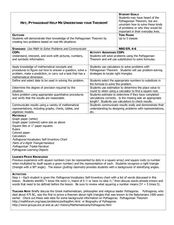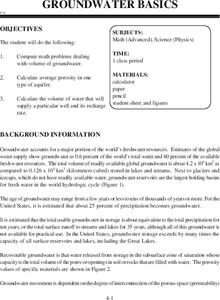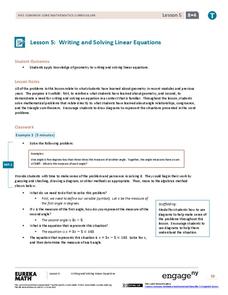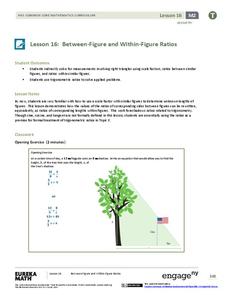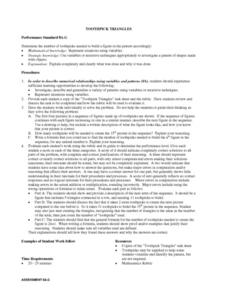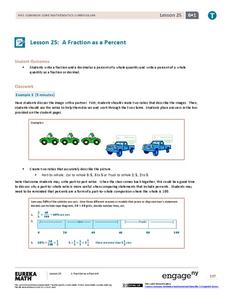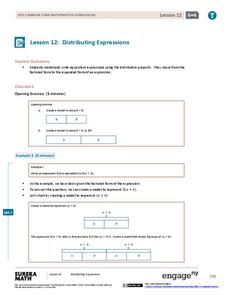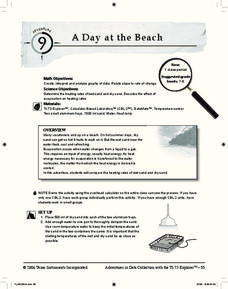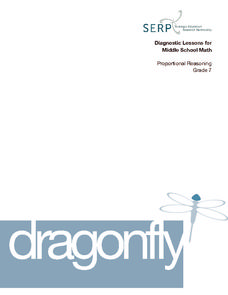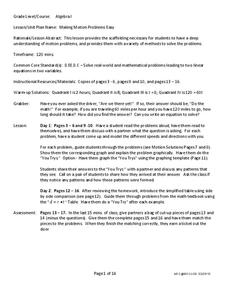Curated OER
Hey, Pythagoras! Help Me Understand Your Theorem!
Learners explore the Pythagorean Theorem. In this math lesson, pupils solve problems using the Pythagorean Theorem. They select the appropriate numbers to substitute in the formula to solve problems.
Curated OER
Groundwater Basics
Groundwater is an essential natural resource, not to mention a fascinating topic to study. Here is a series of twelve amazing lessons on the water source and how we use it in our daily lives. Concepts require higher math and physics...
Environmental Protection Agency (EPA)
The Case of the Mysterious Renters
Upper-elementary kids examine the water usage in their own home, then use that data to solve a case in which a landlady is trying to determine how many people are living in an apartment being rented. Combine math, scientific method, and...
NTTI
Putting Together Ten
Groups explore sets of 10 items in two varieties (i.e. 3 white buttons and 7 black ones, or 5 bears and 5 bunnies). They brainstorm about their objects, write math sentences to represent what they have, and report their discoveries...
Curated OER
Come Into my Parlor
An interesting cross-curricular lesson on dairy farming awaits your students. Elements of language arts, math, social studies, and agriculture are all present. Many excellent worksheets and a good article on dairy farming are included in...
Curated OER
Energy Audit
Students collect data about energy usage and use mathematical calculations to analyze their data. In this energy conservation and statistics math lesson, students survey their homes to complete an energy usage worksheet. Students...
Mathematics Assessment Project
Mean, Median, Mode, and Range
What a find! Here is a lesson, designed to meet sixth grade math Common Core standards, that focuses on the calculation of different measures of center for the scores from a penalty shoot-out competition. An independent...
Curated OER
Sun and Shadows
Why do shadows look different in the summer than in the winter? What causes day and night? How can a sundial be used to tell time? Answer these questions and more through two engaging lessons about light and shadows. Fourth and fifth...
Virginia Department of Education
Scatterplots
Math is all fun and games with this activity! Learners use an activity designed around hula hoops to collect data. They create scatter plots with their data and then analyze the graphs for correlation.
EngageNY
Writing and Solving Linear Equations
Incorporate geometry into the solving linear equations instructional activity. Pupils use their knowledge of geometry to write linear equations which reinforces geometry measurement concepts while at the same time providing a...
EngageNY
Between-Figure and Within-Figure Ratios
Tie the unit together and see concepts click in your young mathematicians' minds. Scholars apply the properties of similar triangles to find heights of objects. They concentrate on the proportions built with known measures and solve to...
EngageNY
Read Expressions in Which Letters Stand for Numbers II
Reading and writing take on a whole different meaning in math class. Young mathematicians learn to read verbal phrases by focusing on operation words. They write equivalent algebraic expressions for both mathematical and contextual...
Curated OER
Worksheet 2: Graphs, Functions and Derivatives
In this math worksheet, students answer 7 questions having to do with graphing derivatives of functions, rectilinear motion, speed and distance.
Armory Center for the Arts
Place Value Collage
How can art represent math? Use a lesson on place value collages to illustrate the different meanings that numbers have in their designated places. Kids observe photographs and paintings that show place value, then work on their own.
Curated OER
Toothpick Triangles
Students draw a chart (included in the lesson) to use with their investigation. They review terminology of triangles and receive toothpicks to use in the lesson. Beginning with three toothpicks, students form a triangle. They complete...
Curated OER
Worksheet 12: Functions
In this math worksheet, young scholars are given 7 problems in which they differentiate, figure rate of change, determine value, and prove formulas.
Curriculum Corner
Guest Teacher Plans: Kindergarten
Emergencies happen. Be prepared the next time you have to call in a substitute with a lesson plan designed to meet the needs of a kindergarten class. Throughout the day, class members work with number and alphabet cards, identify numbers...
EngageNY
A Fraction as a Percent
It is all about being equivalent. Class members convert between fractions, decimals, and percents. By using visual models, scholars verify their conversions in the 25th portion of a 29-part series.
EngageNY
Graphs of Simple Nonlinear Functions
Time to move on to nonlinear functions. Scholars create input/output tables and use these to graph simple nonlinear functions. They calculate rates of change to distinguish between linear and nonlinear functions.
EngageNY
Efficacy of Scientific Notation
How many times could California fit into the entire United States? Pupils use scientific notation to find the answer to that question in the 12th installment of 15 lessons. It asks scholars to write numbers in scientific notation and...
EngageNY
Distributing Expressions
You know how to factor expressions; now it's time to go the opposite way. Scholars learn to write algebraic expressions in expanded form using the distributive property. A problem set helps them practice the skill.
Curated OER
A Day at the Beach
Help learners determine the rate of change for the temperature of sand. They will collect data on the temperature of wet and dry sand over time with a heat lamp overhead. Then make a scatter plot of the data and find a linear model to...
Curated OER
Dragonfly
The speed of a dragonfly brings math into the real world as your learners collaboratively see the value in calculating unit rates in direct proportion problems. This six-phase lesson encourages you, as the teacher, to only ask questions...
West Contra Costa Unified School District
Motion Problems
Let's hope class participants don't get motion sickness. In the lesson, class members first solve motion problems using tables and graphs. They then use algebraic techniques to solve motion problems.
Other popular searches
- Time Math Lesson
- Math Time
- Math Telling Time
- Maths Telling Time Clocks
- Math Challenge Problems Time
- Date and Time Math
- Math Lessons Time Duration
- Time Math Lesson Plans
- Canadian Time Zones Math
- Life Skills Math Time
- Time Domino Math Games
- Time Math Curse


